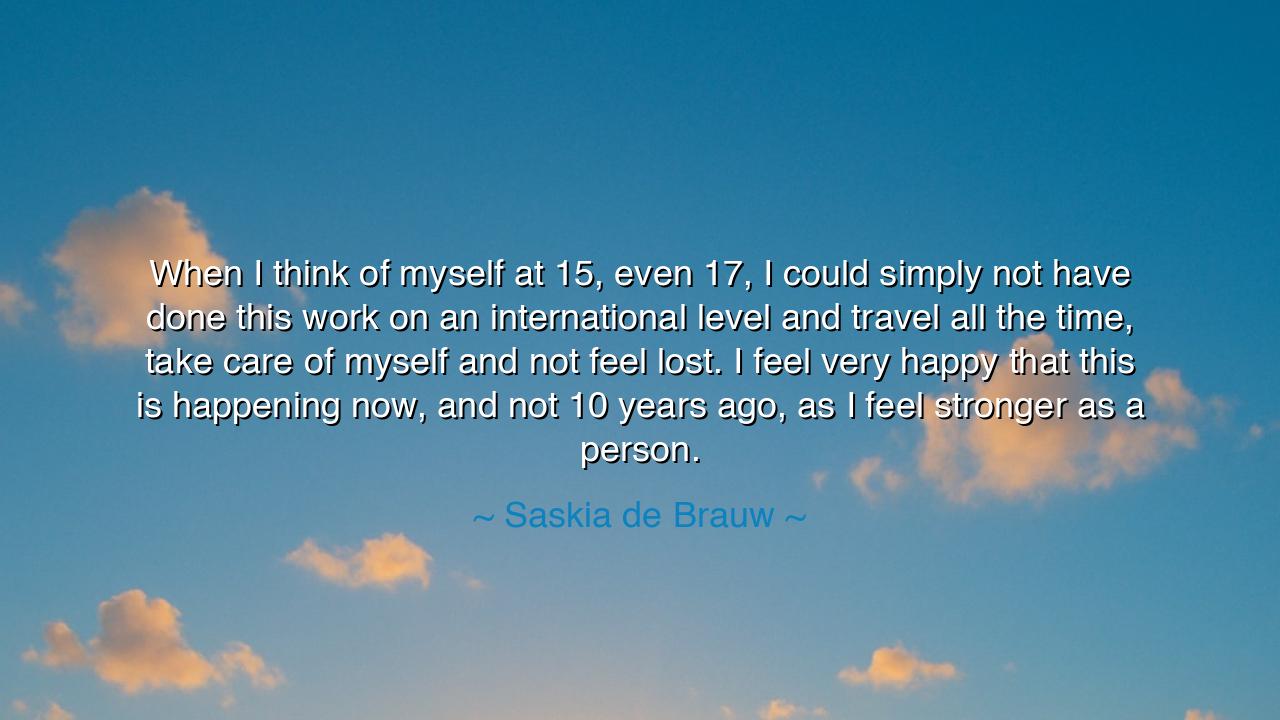
When I think of myself at 15, even 17, I could simply not have
When I think of myself at 15, even 17, I could simply not have done this work on an international level and travel all the time, take care of myself and not feel lost. I feel very happy that this is happening now, and not 10 years ago, as I feel stronger as a person.






The words of Saskia de Brauw — “When I think of myself at 15, even 17, I could simply not have done this work on an international level and travel all the time, take care of myself and not feel lost. I feel very happy that this is happening now, and not 10 years ago, as I feel stronger as a person.” — shine as a testimony to the wisdom of time, to the truth that life’s seasons unfold not in haste, but in the hour appointed for them. Her words teach us that strength is not born fully formed in youth, but is tempered slowly by the fire of experience, until the soul is ready to bear the weight of destiny.
To be 15 or 17 is to stand on the threshold of the world, but not yet to possess the fortitude to walk boldly into its storms. At that age, one is tender, still gathering the fragments of selfhood, easily swept away by the noise of the world. De Brauw confesses that in those years she would have been lost, unable to withstand the trials of constant travel, the solitude of independence, the heavy demand of work on a global stage. Yet now, in a later season, she proclaims herself stronger, able to hold herself upright against the winds of circumstance. This is the lesson of patience: that what is too great for the child becomes fitting for the matured soul.
The ancients also understood this truth. Consider Alexander the Great, who, though a genius in war, was thrust into conquest at too young an age. His brilliance shone, but his youth burned too hot, driving him into reckless campaigns that exhausted his men and left his empire fragile at his death. Contrast him with Cincinnatus of Rome, who came to leadership later in life, tempered by age and humility. Called from his plow to serve Rome, he ruled wisely, defended his people, and then returned to his farm, content in spirit. The one had youth without restraint, the other maturity with wisdom. Time had shaped Cincinnatus into a man strong enough to hold power without being consumed by it.
De Brauw’s reflection is thus not a mere personal confession, but a universal truth: that the unfolding of destiny must align with the growth of the soul. Many crave success in their early years, longing for greatness before their foundation is firm. Yet those who ascend too quickly often fall, unprepared for the trials of visibility, of solitude, of ceaseless motion. True success is not measured in how swiftly it comes, but in how deeply it is sustained — and sustainability requires the strength that only time and experience provide.
There is also a profound humility in her words. She does not boast of talent or triumph, but rather rejoices that her time has come not too soon, but now — when she is prepared to receive it with steadiness. To recognize that one was once too fragile is not weakness, but wisdom. For many deny their past unreadiness, yet she embraces it, and by doing so, honors the slow and patient work of becoming. It is in this humility that her strength reveals its true depth.
The lesson for the generations is this: do not despise the years of preparation. Do not grow restless if your great calling has not yet arrived. For the tree that rushes to bloom too quickly will break beneath the storm, but the tree that deepens its roots will endure and flourish in its season. Your strength is forged not in haste, but in the quiet shaping of time, in the daily labor of self-mastery, until the hour comes when you may bear great burdens without being crushed.
Practically, let each listener live with patience and courage. When you are young, use those years to learn, to build, to grow. Do not covet the work that is not yet yours, but prepare yourself for the work that will come in its rightful time. And when the season of responsibility arrives, receive it not with fear, but with gratitude, knowing that you have been made stronger by the waiting. In this way, life unfolds not as a burden, but as a harmony between the soul’s readiness and destiny’s call.
Thus Saskia de Brauw’s words, spoken of her own journey, rise into eternal counsel: that there is wisdom in waiting, and strength in timing. To be lost in youth is natural; to be strong in maturity is the fruit of patience. Let each of us trust the seasons of our becoming, so that when our moment comes, we may stand firm, joyful, and unshaken.






AAdministratorAdministrator
Welcome, honored guests. Please leave a comment, we will respond soon